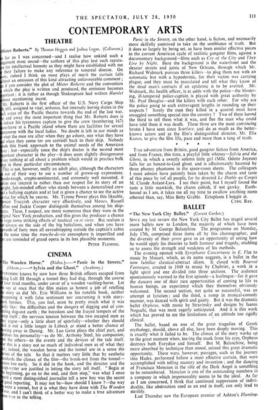CONTEMPORARY ARTS
THEATRE ister Roberts." By Thomas Heggen and Joshua Logan. (Coliseum.) far as I was concerned—and I realise how unkind such a gement must sound—the authors of this play lost such reputa- n for intellectual honesty as they might have established with me their failure to make any reference to venereal disease. On ny, indeed I think on most plays of merit the curtain falls thout an omission of this kind attracting unfavourable comment ; t if you consider the plot of Mister Roberts and the convention which the play is written and produced, the omission becomes portant ; it is rather as though Shakespeare had written Hamlet thout mentioning incest. Mr. Roberts is the first officer of the U.S. Navy Cargo Ship 603, assigned to vital, arduous, but intensely boring duties in the ck areas of the Pacific theatre towards the end of the last war. r and away the most important thing that Mr. Roberts does is induce his tyrannous captain to give the crew (numbering 167) re-leave at a Pacific island where there are facilities for sexual ercourse with the local ladies. No doubt is left in our minds as what the men are after when they go ashore, nor what they have d when they come (or are carried) back to their ship. Nobody nds this frank approach to the animal needs of the American vy ; but—especially since the ship's doctor is the second most portant character in the play—it does seem slightly disingenuous say nothing at all about a problem which would in practice bulk ,e in these particular circumstances. This is not, however, really an adult play, although the characters out of their way to use a number of grown-up expressions. udo-tough, crypto-sentimental, and extremely well mounted, it lists our interest in rather. than our respect for its story of an right, fair-minded officer who stands between a demoralised crew d a bullying captain and at last is given a chance to see the active vice for which he yearns. Mr. Tyrone Power plays this likeable, ncer Tracyish character very effectively, and Messrs. Russell lins and Jackie Cooper distinguish themselves among his ship- tes. These, I suspect, are more numerous than they were in the ginal New York production, and this gives the producer a chance stage some striking effects of nautical va et vient. But realism is t always on the side of the big battalions, and when you have wards of forty men all eavesdropping outside the captain's cabin the same time the tranche-de-vie atmosphere is imperilled and u are reminded of grand opera in its less plausible moments.
PETER FLEMING.


































 Previous page
Previous page